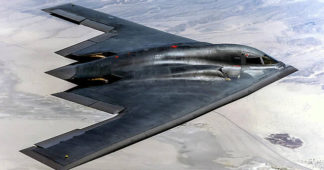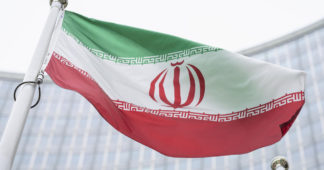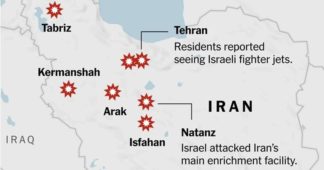For many ardent evangelicals and Christian nationalists, a military confrontation with Iran is the fulfillment of a biblical prophecy.
The long political hangover from the catastrophic Iraq invasion is a crucial reason that some elements of the MAGA coalition are dissenting from Trump’s bombing attack. Even stalwart Trump lackeys like Georgia GOP Representative Marjorie Taylor Greene are distancing themselves from the action, while longtime MAGA propagandists such as Tucker Carlson and Steve Bannon are rushing to disclaim any support for another American “forever war” in the Middle East. America First critics of the Trump attack are also quick to cite opinion polls showing a vast majority of Americans opposing a US war in Iran.
Yet, for all the genuine reluctance that prominent MAGA figures are airing over the prospect of veering into another Middle East quagmire, there’s a bedrock constituency that has always promoted aggressive military action against Iran: the increasingly influential evangelical wing of the Trump movement. For ardent evangelicals and Christian nationalists, a military confrontation with Iran is far from a threat to upend the region’s delicate balance of power or to derail US diplomatic aims in the Middle East. A war with Iran is, instead, a fulfillment of biblical prophecy and a step on the path to final redemption for embattled Christians.
This line of theocratic bellicosity is most closely associated with right-wing Pentecostal pastor John Hagee, the founder and chairman of Christians United for Israel. In the run-up to Trump’s weekend attack, Hagee told Fox News that Trump was uniquely suited to pursue a biblically mandated policy of cutting down Israel’s enemies. “I do not think President Trump will allow himself to be played by Iranian negotiators or American isolationists,” Hagee declared. “When it’s all said and done, I believe President Trump is willing to do what it takes to ensure Iran is defanged either by enabling our strongest ally, Israel, to defend itself or otherwise.”
After the attack, Hagee amplified his battle cry in a recorded statement: “We must stand with Israel today and every day. Iran’s future as an evil force in the Middle East is now in question.… Now the US must take its seat at the head of the international table and stand alongside the only American ally in the free world willing to do what is necessary to protect the free world.”
Such bloody-minded cheerleading is nothing new for Hagee. Indeed, in the initial phase of Israel’s genocide in Gaza, Hagee was already urging the United States to attack Iran. “The righteous rage of America must be focused on Iran,” he announced from the pulpit. “Let me say it to you in plain Texas speech: American should roll up its sleeves and knock the living daylights out of Iran for what they have done for Israel. Hit them so hard that our enemies will once again fear us.”
Hagee’s son and co-pastor, Matt, took up the same theme with scriptural gusto: “God has a hook in the jaws of these nations, and he’s drawing them here. God tells Ezekiel exactly how he’s going to defend Israel. He speaks about raining down fire and hail and brimstone. That’s a heavenly air assault.”
The prophetic character of these pronouncements reflects the purely instrumental view that evangelicals adopt in their embrace of Israel. Because New Testament prophecy holds that the repatriation of Jews to Israel—and their subsequent conversion to Christianity—is a pivotal sign that the end times are at hand, the Netanyahu government’s vision of a greater Israel, keen to punish rival faiths and nations, supplies a glide path to the Final Judgment for US evangelicals and the ensuing mass elevation of Christian believers into eternal bliss. Hagee’s version of this belief is perhaps the most extreme one on the evangelical right, but he’s far from alone in championing a righteous US-Israeli alliance against Iran. Dr. Mike Evans, founder of the evangelical pro-Israeli group Friends of Zion, which claims some 30 million members, cited a scriptural passage of the pro-Zionist evangelical right in making the theological case for an Iran war to Fox News: “In Genesis chapter 12, God said, ‘I will bless those who bless you, and I will curse him who curses you.’ Evangelicals believe that pressuring Israel to give up land will bring a curse on America. If they have to choose between God’s word and anyone else’s, they will choose God’s word.”
You also don’t have to look very far in the Trump White House to find the same sentiments. Defense Secretary Pete Hegseth, the administration’s point man on the Iran bombings, is an ardent Christian nationalist who has endorsed the idea of an “American crusade” to “push Islam back”—sentiments he’s inscribed on a pair of back tattoos, one memorializing the Jerusalem Cross from the European Crusades of the Middle Ages and the other citing the crusaders’ slogan “Deus Vult,” Latin for “God wills it.”
Hegseth is formally aligned with the Reconstructionist wing of evangelicalism, which isn’t steeped in the dispensationalist tradition of end times prophecy, but like many spiritual figures in the MAGA orbit, he embraces a synthetic and improvisational view of the encounter between history and scripture—and in a way that can one-up the eschatology of the older evangelical movement. “There’s this video on YouTube, from the first Trump administration, when Hegseth was at the King David Hotel in Jerusalem and he’s saying, ‘Hey, you know people talk about the third temple’”—a triumphalist fantasy of the independent charismatic movement and messianic Jews alike—“‘it looks unlikely but you know, it could happen,’” Matthew Taylor, a student of the Trumpist-charismatic alliance, said. “That is grounds for an interreligious World War III—a Christian effort to take down the third-holiest site in Islam. And this is the [future] secretary of defense making this casual speculation, and in an almost giddy mode.”
Hegseth’s broad endorsement of a prophecy belief that’s more or less bespoke to the US evangelical worldview is in line with the distressing convergence of MAGA with what Taylor calls independent charismatic Christianity. This brand of Christian nationalism commands broad allegiance on the MAGA right—Paula White, senior adviser to Trump’s White House Faith Office, and Russ Vought, his enormously influential director of the Office of Management and Budget, are both aligned with its theology and governing agenda, and Texas Senator Ted Cruz is the son of a well-known charismatic pastor. The independent charismatics’ brand of present-minded spiritual warfare was also pivotal in the run-up to the January 6 insurrection at the US Capitol.
With the prospect of an expansive war in the Middle East, MAGA-minded charismatics will seize on the rush of events to sanctify their preexisting worldly vision of conquest and success, Taylor, the author of The Violent Take It by Force: The Christian Movement That Is Threatening Our Democracy, said. “We’re in a moment now when we could see a much more unruly evangelical theology than the older dispensationalism take hold,” he observed. “Dispensationalism is very straight and narrow. It’s quite conservative in a certain sense, in that the goal is to create a state of Israel and to protect that state until Jesus comes back.”
“But this other, more bellicose, ad hoc version of prophecy is in line with the goals of the charismatics—global domination, conquest, prosperity,” Taylor said. “It tends to embrace a more unequivocal support of the state of Israel, and even a desire for drama. The charismatic aesthetic is about melodrama and cosmic war, and about this celebration of geopolitical fights as symbolic of the battle between God and the devil.”
In other words, just as Trump has shed his bogus anti-interventionist posture to embrace the neoconservative delusion of regime change in Iran, a significant segment of his base is in the process of annexing the unprovoked attack on Iran into their choose-your-own-apocalyptic-adventure version of prophecy belief. Be afraid.
We remind our readers that publication of articles on our site does not mean that we agree with what is written. Our policy is to publish anything which we consider of interest, so as to assist our readers in forming their opinions. Sometimes we even publish articles with which we totally disagree, since we believe it is important for our readers to be informed on as wide a spectrum of views as possible.











